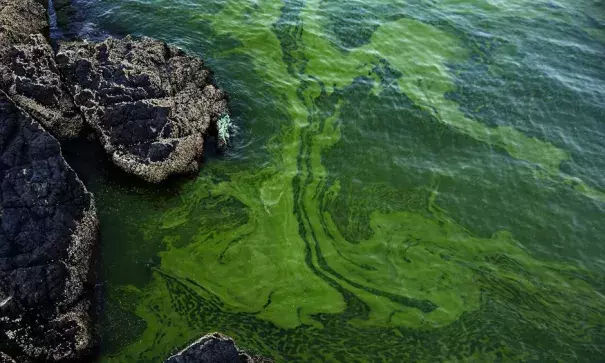Growing algae bloom in Arabian Sea tied to climate change

The Gulf of Oman turns green twice a year, when an algae bloom the size of Mexico spreads across the Arabian Sea all the way to India.
Scientists who study the algae say the microscopic organisms are thriving in new conditions brought about by climate change, and displacing the zooplankton that underpin the local food chain, threatening the entire marine ecosystem.
Khalid al-Hashmi, a marine biologist at the Sultan Qaboos University in Oman, wrinkles his nose as the research vessel nears the bloom. "Sea stench," he says, referring to the algae's ammonia secretions. "It's here, you can smell it."
...
The swarms of microscopic creatures beneath the surface of the Gulf of Oman were all but invisible 30 years ago — now they form giant, murky shapes that can be seen from satellites.
Across the planet, blooms have wrecked local ecosystems. Algae can paralyze fish, clog their gills, and absorb enough oxygen to suffocate them. Whales, turtles, dolphins and manatees have died, poisoned by algal toxins, in the Atlantic and Pacific. These toxins have infiltrated whole marine food chains and have, in rare cases, killed people, according to the U.N. science agency.
...
Scientists based at the Lamont-Doherty Earth Observatory at Columbia University trace Oman's blooms to melting ice in the Himalayas. Less ice has raised temperatures in South Asia and strengthened the Indian Ocean's southwest monsoon. As this weather front moves across the Arabian Sea every year, it churned up oxygen-poor water thick with nutrients that have fueled the rise of a 1.2-billion-year old algae called noctiluca scintillans.
For the past 15 years, observatory biogeochemist Joaquim Goes, al-Hashmi and biological oceanographer Helga do Rosario Gomes have tracked blooms in the Arabian Sea using boats, satellites and remote sensors.
Goes said the blooms have caused a "short-circuiting of the food chain," endangering other marine life.
"Normally these things happen slowly, usually we talk about tens of hundreds of years. Here it's happening overnight," he said. "The transformation is happening before our eyes."


